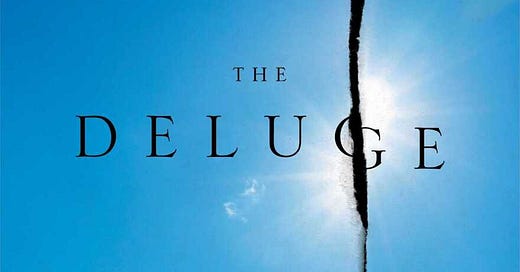A review of The Deluge, by Stephen Markley (2023)
The Deluge is a tome, a vast and sprawling novel with myriad narrative threads. Tracking the future of American society between 2013–2040 against the backdrop of worsening climate change, the reader is shown a nation plunging fitfully into turmoil – with hard-fought moments of recovery and sudden, devastation catastrophes.
Though entertaining, passionate, and thrilling, I am not the only person who struggled to follow this novel at times. Aside from inhabiting the same world and feeling the ripple effects of each other's decisions, the book's many protagonists and narratives often never intersect. Its plot threads range from dry discussions of legislation to explicit descriptions of sex and domestic violence. We follow racists and utopians, terrorists and financiers, idiots and savants. You’d probably struggle to find a single person (outside Markley himself) who would have a distinct interest in every aspect of the novel. That said, there is something in it for almost everyone.
The Deluge is often pegged as Cli-fi, a narrative exploration of the climate crisis and its impacts on us. But this book is much better described as polycrisis fiction (which lacks a catchy genre name): an exploration of how people react to, abet, and survive the traumatic concatenation of multiple crises. The strength as well as weakness of The Deluge is that it shows this irrevocable change across the whole gamut of American society — from rarefied wealth to wretched poverty. As engrossing as each narrative is, the overarching plot can often feel hazy and confusing.
But being such a sprawling novel also helps convey how dramatic change happens in reality. You work, you love, and you live and then one day look around and everything has changed. Or, conversely, nothing seems to change despite the warning signs, till one day your world is so suddenly and devastatingly altered that it becomes impossible to truly believe it was ever as it was before. The true narrative of The Deluge is not any one story, but the steady unfolding of political, social, and ecological history itself. Markley’s extrapolation of current trends, ranging from weaponised AI and social media addiction to climate chaos and political extremism come to jarring — but never unbelievable — conclusions.
Throughout this Markley paints a masterful portrait of the human condition. The Deluge should be lauded for its thoughtful depictions of addiction and autism, though all the relationships within are complex, heartfelt, and bittersweet — even with his slightly-too-prominent fixation on interracial sex. This is, unfortunately, also something often lost in the tumult of the wider narrative. But perhaps that is the point? For all the importance our relationships hold they are ephemeral moments of calm (or turbidity) in much wider currents of change.
A novel as ambitious as Deluge was, in a sense, always destined to fail at succinctly telling its story. Yet it is because of this that it can leave such an impact. Chaotic, meandering, and vast in scope, what made The Deluge so disturbing and emotive is it reflects our failure to understand the history we are living through. There is no Whiggish ascent, there is no end of history, and the world's narrative — especially in its most torrid episodes — will always defy transcription.
-Ben Shread-Hewitt
Other Reviews of Climate Fiction Books:
Working from First Principles: ‘Parable of the Sower’ (Octavia E. Butler, 1993)
A review of ‘Parable of the Sower’, by Octavia E. Butler (1993).
Utopia as Ideology: 'The Years of Rice and Salt' (Kim Stanley Robinson, 2002)
A review The Years of Rice and Salt, by Kim Stanley Robinson (2002)






